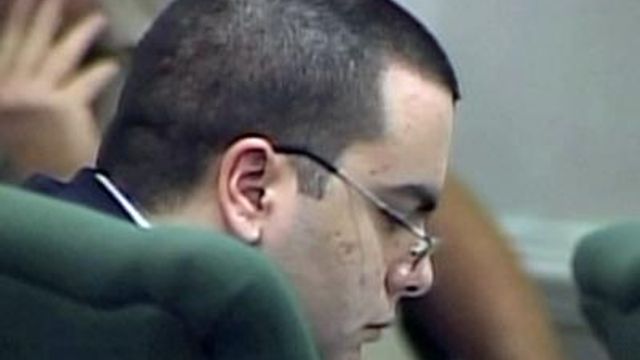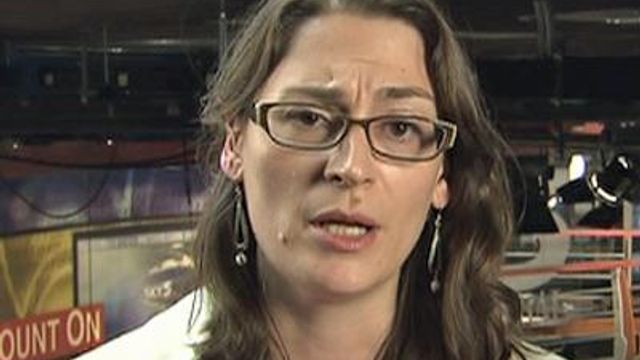Psychologist: Alleged school shooter didn't know 'right from wrong'
An Orange County man was psychotic and "unable to distinguish right from wrong" on the day he allegedly killed his father and shot at his former high school, a psychologist testified Thursday.
Posted — UpdatedAlvaro Castillo, 22, is charged with fatally shooting his father, Rafael Huezo Castillo, on Aug. 30, 2006, and then opening firing at Orange High School, injuring two students. Castillo has pleaded not guilty by reason of insanity.
"He was not in touch with reality at that time," Dr. James Hilkey said.
Castillo suffered from schizotypal personality disorder – once called borderline schizophrenia – and an obsessive-compulsive personality disorder, Hilkey said. Those disorders created a "set of instructions" that Castillo felt compelled to carry out, he said.
"It was very real to him. It emanated from God," Hilkey said. "He knew it was against the law to kill, but because of his delusional belief, he was unable to distinguish between right and wrong."
Castillo was diagnosed as psychotic several times after trying to commit suicide in April 2006, but a specific disorder wasn't determined, said Deborah Grey, a licensed clinical social worker. A UNC Hospitals psychiatrist, who examined Castillo hours after his arrest, and another social worker also testified that he is psychotic.
The personality disorder made Castillo "socially ill at ease" and prone to "tangential or paranoid belief systems," Hilkey said. Although "eager to please," Castillo couldn't connect with others in "an intimate, adult way," so the obsessive-compulsive disorder pushed him to conform to others' standards, the psychologist said.
Hilkey pointed out that Castillo's grades were above what would be expected from his IQ of 90.
"This is a concrete example of how this young man tried to conform to ... the expectations placed on him by his father, but also by his mother, to work hard, to achieve," Hilkey said.
Castillo often felt guilty for breaking religious laws and was exposed to domestic abuse and pornography at an early age, Grey said.
As a child, he felt bad about himself and struggled with his sexuality, Hilkey said.
He believed God told him to sacrifice his father, as Jesus was sacrificed, according to a statement his mother, Vicky, made to investigators soon after the shootings. Prosecutors read the statement Wednesday.
"He definitely believed that a lot of the influences in his life were directly from God," Hilkey said. "I think this contributed to his delusional thinking."
Grey testified that Castillo and his family did not fully cooperate with mental health professionals after he attempted suicide.
Under cross-examination, Grey agreed with Orange County District Attorney Jim Woodall's statement that "it's very clear that the defendant withheld a great deal of information from the people who were attempting to help him."
"That he had weapons, gone to Columbine, was sleeping with weapons, none of that was ever reported to either of these treatment teams," Grey said.
According to testimony, Castillo was obsessed with the 1999 massacre at Columbine High School, and his mother took him in June 2006 to visit the school and the neighborhoods where shooters Eric Harris and Dylan Klebold lived in the hope that his fascination with the incident would wane.
Castillo also seemed worked up over the 2007 Virginia Tech shootings, Hilkey said. Initially, Castillo was sad, but then “there was a kind of excitement” when talking about the massacre, according to Hilkey's afternoon testimony.
Grey admitted to being surprised at testimony from Castillo's sister, Victoria, that she hadn't seen bizarre behavior by her brother. Grey's report included descriptions from Victoria Castillo of hearing her brother clicking his rifle in his bedroom and once catching him making a video while holding some guns.
Castillo's family initially told the staff at UNC Hospitals that he was behaving bizarrely and obsessed with death, and Castillo said he believed the FBI watched him through cameras in bathroom vents, Grey said. After a couple days, though, Castillo denied having suicidal or homicidal thoughts anymore and continued to tell medical personnel he didn't have them up until the time of the shootings, she said.
Castillo followed through with treatment at Oasis, a clinic attached to the hospital, Grey said. But bureaucratic delays hampered his treatment with a local clinic, Caring Family Network. Then, Castillo refused to make appointments with a clinic social worker who called him repeatedly, she said.
On Aug. 29, 2006, Castillo left a voicemail with the clinical social worker, saying he was doing fine but could make an appointment the next morning – the day of the shootings, Grey said.
• Credits
Copyright 2024 by Capitol Broadcasting Company. All rights reserved. This material may not be published, broadcast, rewritten or redistributed.






